SEO for Podcasters: How to Be Discovered by Your Target Audience

SEO might be a term you initially discovered in the mouldy depths of your spam inbox. It means “Search Engine Optimization”, which is a boring way of saying, “I’m publishing content online, and I’d like people to find it easily.” That’s not a particularly interesting way of saying it either, is it? In any case, SEO for podcasters is our topic of the day, and we’re here to help you make your show more discoverable for those who need it.

So, as you might’ve gathered, SEO is how to write about your podcast so it’s easier to find in search engines. Good SEO for podcasters is important in podcast directories, on social media, or, as they say, “wherever you get your podcasts.” It doesn’t seem fun, but it can be once you use the same creativity you put into your podcast with your SEO.
You might say, “I don’t need to know how to use SEO to promote my show. I can use one of these nifty AI podcasting tools to write all my promotional assets for me.” Sure. But, when you understand how SEO works and why, you’ll understand why some tools are better than others. Knowing how SEO works helps you understand why some assets help you reach the right audience, and others don’t. Let’s explore good SEO for podcasters, why it matters, how to use it, and how it can help you cultivate your audience.
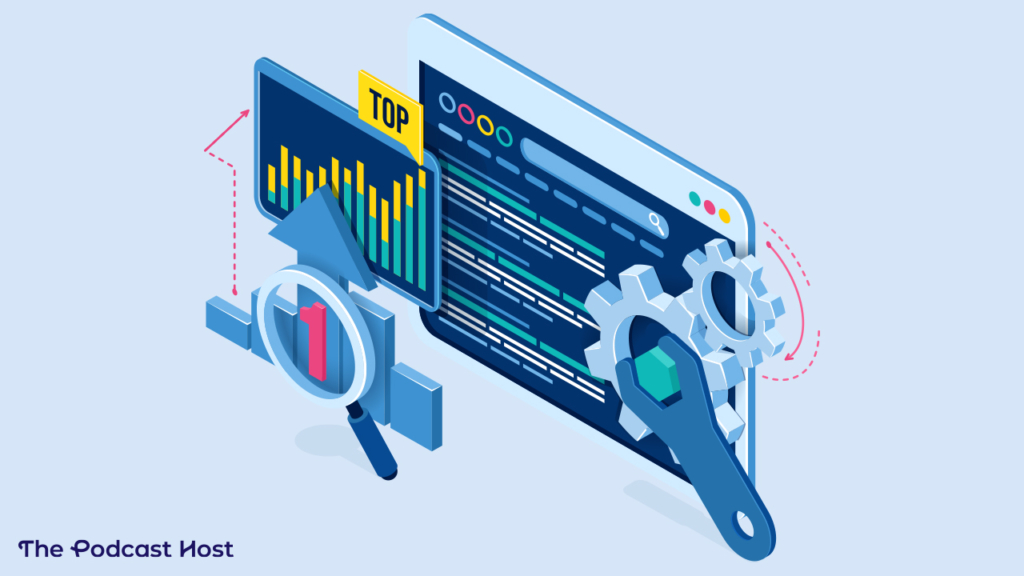
SEO for Podcasters: What Is It?
As AI grows rapidly, we’ll see many innovative new ways search engines can crawl through media such as audio and video files. For the time being, though, the bulk of your SEO “juice” will come via your written content. That could be anything from your podcast title, summary, and episode descriptions to podcast transcripts, show notes, and supplementary materials. Even images have written content in the form of alt-text tags. These things aren’t purely for SEO, though; they help bring your audience more value.
That said, they need to actually find your show in the first place to get access to that value. So how does it all work?
As an example, let’s say you have a podcast about baking pies. Your podcast website can have a blog post for each episode, which can include:
- the episode’s description
- an embedded player
- the episode’s show notes
- resources mentioned in the episode
- supplementary materials that clarify or reinforce your episode’s content.
You want to ensure that people looking for reliable information about baking pies can find your show. So, if you have an episode about apple pie, you’ll want to include the phrase “apple pie” in all those elements. It sounds obvious, but you’d be amazed at how many people will opt for “Davy’s Podcast, Episode 6”, instead. So get your keywords in the title and show notes. This is what’s known as “Keyword SEO”.
Continuing with our baking angle, keyword SEO is a bit like adding salt to your food. It’s easy to go overboard and ruin the taste. Repeating search keywords is good, but too much is bad for your SEO. Repetition (or “keyword stuffing”) is weak writing, reduces value, and insults your audience’s intelligence. Plus, search engines tend to “think” a human didn’t write the article and won’t give the blog post a good rank.
SEO for Podcasters: What is a “Search Engine” Anyway? (& Where Does SEO Happen?)
Taking a step back for a moment, you might be wondering what a “search engine” actually is, and also, where they work.
A search engine is really just any platform that lets a user search for content. It’s unlikely you need me to tell you that Google is a search engine. But there are loads of others, from Bing to DuckDuck Go. Maybe there are even still folks out there who like to Ask Jeeves?
Maybe?
Anyway, these search engines scan the entire public web for results, from blog posts to bulletin boards and everything in between. But a search engine can also be a closed system. YouTube, for example, is widely considered to be the second biggest search engine in the world, and it only searches YouTube content.
Podcast listening apps are also search engines, but again, they’re not searching the web – only the podcasts available within them.
So as a podcaster, there are really two sides to your SEO strategy. Your podcast SEO hones the performance of the show inside listening apps, and your overall SEO is where you classically try to make your website rank well in Google.
These work in harmony because more visits to your website can boost podcast downloads, whilst more podcast downloads can send more traffic to your website.
The Importance of SEO for Podcasters, or Why Does It Matter?
Podcast discoverability, or how audiences find new shows to connect with, is complicated. Many people ask for recommendations from friends directly or on social media. And, when people experience a podcast they love, they tell everyone they know about it. But, in our podcast discoverability survey, word of mouth wasn’t the top method respondents cited for finding new podcasts. 40% of respondents searched in their podcast listening app’s directory.

It’s true that if you create clear, unique, exciting content, your fans will tell others about it. But, depending on your audience to promote your show via word of mouth puts your PR strategy out of your control. SEO puts that control back into your hands.
How To Optimize Your Podcast’s Keywords: Polish Your Assets
Your podcast has a lot of points where people can engage with it. The most obvious are the podcast name (or title), podcast description, episode titles, and episode description. Think of these as the front door of your podcast. You want to make sure the address is clear while providing accessibility and curb appeal.
Let’s dig into these a little more.
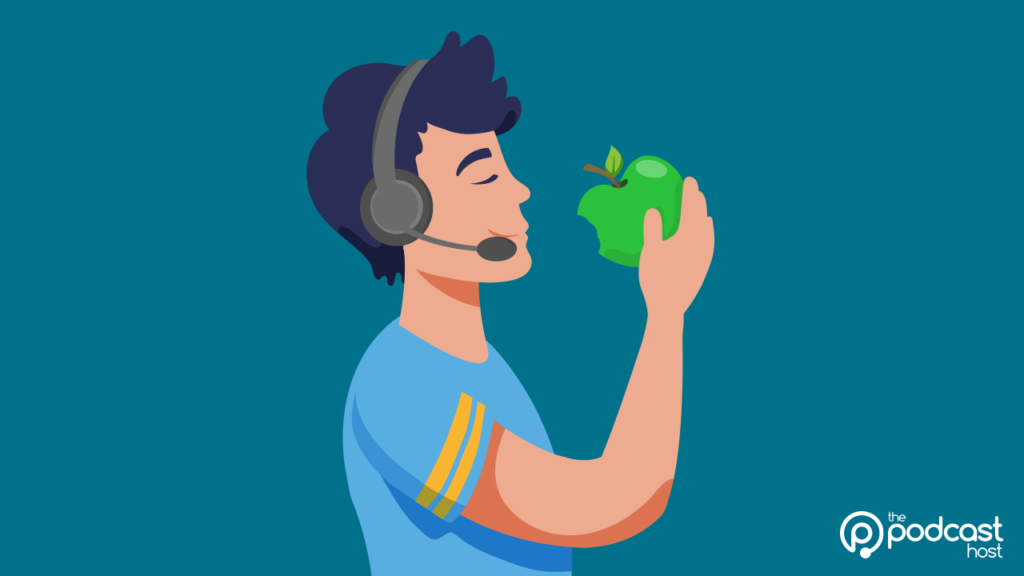
Podcast Title (or Overall Podcast Name)
There are a lot of different strategies to come up with the perfect podcast title. In terms of SEO for podcasters, you should focus on what your show does, how it does it, and who it’s for.
Getting back to our hypothetical baking podcast, let’s say we run a podcast about how to bake pies, using American 1930s Depression-era recipes, for LGBTQIA+ people who are beginners at baking. If your target audience searches for a podcast to help them enjoy learning to bake on a budget, which show sounds like the ticket?
- The Pie Podcast
- From Rations to Delicacies: A Queer Beginner’s Guide to 1930’s Pie Baking
The latter tells us flat-out what it is, what it does, and who it’s for. Plus, “From Rations to Delicacies” implies attention to detail and intelligence.
I can tell you right now, “From Rations to Delicacies” would look absolutely fabulous in the right font on that podcast merch, too.
Whatever great name you cook up, just be sure to run a quick search to make sure no one else is using it. You can also change your podcast title at any time, so if you’re already running a podcast and think the name isn’t working for you, you’re not bound to it. Check out our guide to podcast names for a deeper dive into this.
Podcast Description
Your podcast description is crucial, not only to how people find your show but whether or not they hit play. According to our Podcast Discovery Survey, it’s the most important element for potential new audiences. Plus, search results display it as part of the link preview. Don’t waste any of this space with, “This is the podcast about…” or “In this podcast, we’re going to talk about…” Yes, obviously, we know it’s a podcast, that’s why we’re reading podcast descriptions in a podcast directory, what else would it be, a shark?
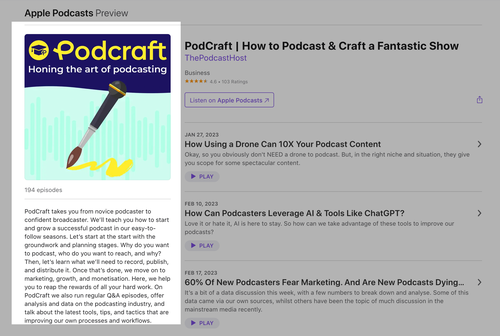
Good SEO for podcasters gets straight to the point here. The audience wants to know what’s in the box, how it works, and who it’s for. You can’t control how many characters the directory displays on every user’s view, or whether they use a mobile device or a tablet. So the first sentence should work as a compelling standalone, even without the rest of the text to elaborate on it.
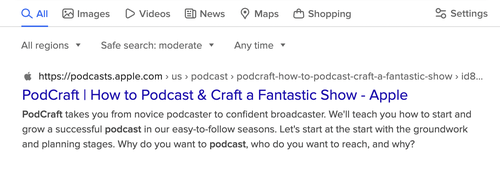
Put what your audience wants upfront. PodCraft does this with, “Podcraft takes you from novice podcaster to confident broadcaster.” For our hypothetical pie baking podcast, again, it could be, “Baking depression-era pie recipes will show off your resilience, creativity and thrift.” Or, “Historic recipes turn your budget fabulous when you learn to bake pies with us.” Nobody said this would be easy. Like haiku, SEO for podcasters means packing the most important information into a compact and beautiful package.
It’s worth adding that, at time of writing, few podcast listening apps actually search podcast descriptions. But, a great SEO-friendly description should still be high on your priority list because:
- This could change overnight (and probably will) as listening apps compete to bring you the best experience.
- A good description is the link between a new listener finding the show and hitting play. It works alongside all of the other SEO for podcasters assets mentioned here.
- Your podcast description can still show up in Google and other search engines.
So give your podcast description some TLC and watch those download numbers take a boost.
Episode Title
Specificity and knowing what your audience wants is the name of the game with your episode titles. If you have an episode about baking mock apple pie, putting “Mock Apple Pie” in the title will have much more impact than any pun about Ritz crackers, however necessary it may be.
This is why you see so many episode titles with a main title, a colon, and a subtitle, like, or “Mastering Mock Apple Pie: Secrets to a Flawless Faux-Fruit Creation.” Just like in your podcast description, put the data they want up front.
Think of your podcast episode titles as the names of non-fiction books. Tell folks what it’s about, and what they will get from it. Make hitting play irresistible to them. Then, all you need to do, is deliver.
Podcast Episode Description (AKA, Your Show Notes)
Here’s another place where you can’t afford to waste character space. Your episode description (or show notes) is what’s going to get them to listen. The opening is crucial because of how directories and social media posts display the descriptions. The rest of your show notes don’t have to be as tightly condensed, but that first paragraph is like a caption for a magazine photograph.
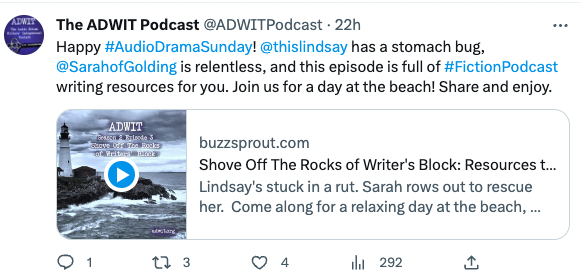
You can see how this Twitter post only shows the first 99 characters of the episode description, and the first 50 characters of the title. Do you really want to waste the first 41 characters with, “In this episode, we’ll talk about?”
Again: focus on what happens in this episode. How does it work? Who’s it for? This will help you build organic SEO traffic for your podcast.
Your Podcast’s Blog Posts and Written Content
Your podcast’s website helps you provide information serially or connected by topic (that’s why they call it The World Wide Web). A podcast website with blog posts and written content makes your content more meaningful, as well as attracts search traffic. There are loads of different ways that the content in your podcast episodes will connect and update as time passes.
In 2011, Marc Maron interviewed comedian Norm Macdonald. When Macdonald passed away ten years later, Maron re-posted the episode in a new website post as an understated tribute to his friend. By posting this on the podcast website, as well as the RSS feed, the audience knows why he re-ran an older episode. Additionally, future audiences can find the interview more easily. Anyone looking up “Norm Macdonald interview” will be more likely to find this particular episode.
When information in one of your podcast episodes complements the content in a different podcast episode, no matter how far apart in time, your website can connect them to make valuable content for your potential listeners.
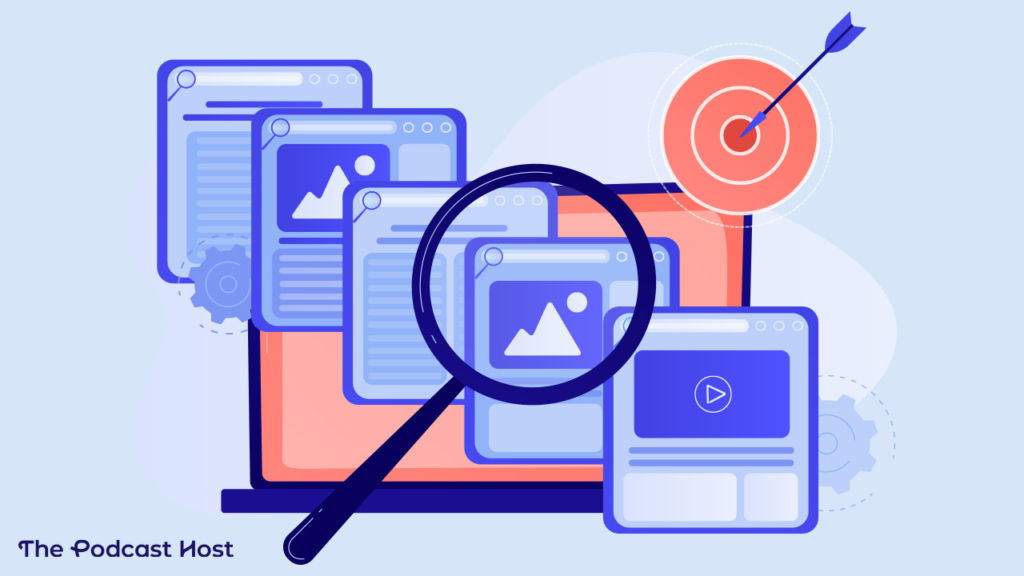
SEO for Podcasters with Transcripts in Blog Posts
Transcripts undeniably aid accessibility for your podcast. There’s an argument that putting the entire transcript, word for word, into your episode’s blog post makes every detail from the show easier for search engines to index. It’ll also be jam-packed with keywords. But transcripts make for lengthy blog posts that read horribly. On top of that, it’s questionable whether search engines like Google pay much attention to these because they value good writing. As brilliant as any recorded conversation might’ve been, the transcript will never look like Hemingway wrote it.
The best way to look at transcription is that it’s an essential accessibility practice. It may not directly benefit your SEO (in the sense of Google ranking your word-for-word transcript highly for a competitive search term). Still, it demonstrates to your audience that you’re committed to making your content available for all. And the ultimate way to grow your podcast is to take care of your audience, is it not?
So, instead of pasting transcripts directly into show notes or blog posts, you can:
- link to your transcript on a document in Google Drive,
- embed a PDF block
- embed a PDF viewer in the page itself (Godspeed, soldier).
No, search engines won’t index the contents of the PDF transcript. You’ll need to use your creativity and critical thinking skills to analyze the episode’s contents, distil it into a brief yet meaningful composition, and put that in your blog post. Then, link to the transcript.
Now you know why your seventh-grade English teacher was so crazy about making you learn how to write haiku.
To sum up this section, though, writing good show notes is how you’ll create the most searchable and discoverable written content for your podcast.
Link Building Strategy for Podcasters
Another aspect of SEO is “link building”. When you link to another site, their authority and credibility affects yours, and vice versa. Search engines like to see you linking to other relevant and useful content. They also notice when another website links back to your own content. We could also call this “authority building”.
SEO for Podcasters Case Study: Maximum Fun
For example: the comedy podcast Judge John Hodgman has very little episode information in its show notes. But, it does a good job of using link building to establish page authority.
Episode 603, Acting in Bat Faith debates whether or not a couple should install a bat house on their property to cut down the summer mosquito population, or avoid being known as “the neighborhood’s weird bat people.”
Blog Post, Instagram Links, Reliable information
The episode post links to the show’s transcript and Instagram page. The Instagram page keeps dissemination consistent. More importantly, the blog post links to bat conservation websites and information about safe bat box installation and maintenance. These helpful resources respect the audience’s intelligence and give them reliable information.
So, what does this have to do with SEO for Podcasters?
Again, it’s that search engines see links between sites as a vote of confidence. The Maximum Fun site’s link to the Lubee Bat Conservancy’s page is like a vote saying that Maximum Fun finds this page’s information reliable and useful. This raises the Lubee Bat Conservancy’s page ranking.
You Are What You EEAT
The Lubee Bat Conservancy’s site is a good example of Google’s quality guidelines. Specifically, they look for:
- Experience (they’ve used the bat boxes they describe and have worked with bat habitats)
- Expertise (they have a high level of knowledge about bat conservation)
- Authority (the power to influence or command thought: their experience and expertise means that most people believe them when they say something)
- Trustworthiness: what they say is independently testable and provable, they don’t rely on misinformation for clicks.
Linking to shoddy websites, obviously, doesn’t make your content look good. Google recommends that you only link content that has experience and expertise, and is authoritative and trustworthy.
And how do you get websites with good authority to link to you? Make good podcast episodes with useful, unique content. Rely on experience, and research your material from credible resources. Earn your audience’s trust. With consistency over time, your content will become authoritative, and other websites will link to you.
Be sure not to try and cut corners here by paying for links or hiring that guy from your spam inbox. Link spam won’t improve your podcast’s SEO; for most search engines, it’s a violation of their Terms of Service. Obviously, qui cum canibus concumbunt cum pulicibus surgent (if you lie down with dogs, you get up with fleas).

How Does SEO Help You Cultivate Your Audience?
It’s one thing to have loads of followers or subscribers, many of whom may not listen or engage. It’s another thing to have an audience who responds to your work. Maybe they write good reviews, support you financially, and recommend you to others. The right audience can even help you find opportunities to improve your show. An AI tool can only do so much with your SEO, because it doesn’t really know what kind of relationship you need to build with your audience, every single time. SEO for podcasters doesn’t simply make your podcast easier to find. Good SEO helps the right people find your podcast.
Ready to test out some new ideas for podcast names, descriptions, and episode titles? Join us in the IndiePod Community where you’ll get helpful feedback from the team, as well as your friendly fellow independent podcasters!
